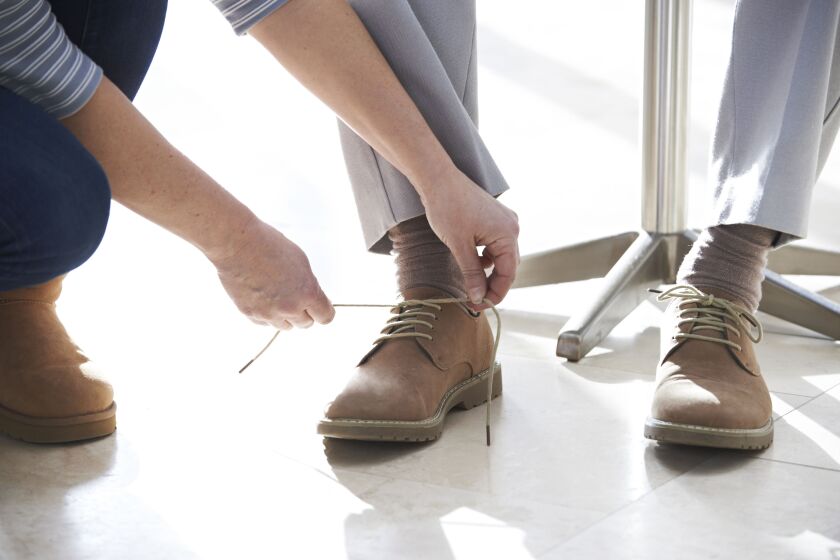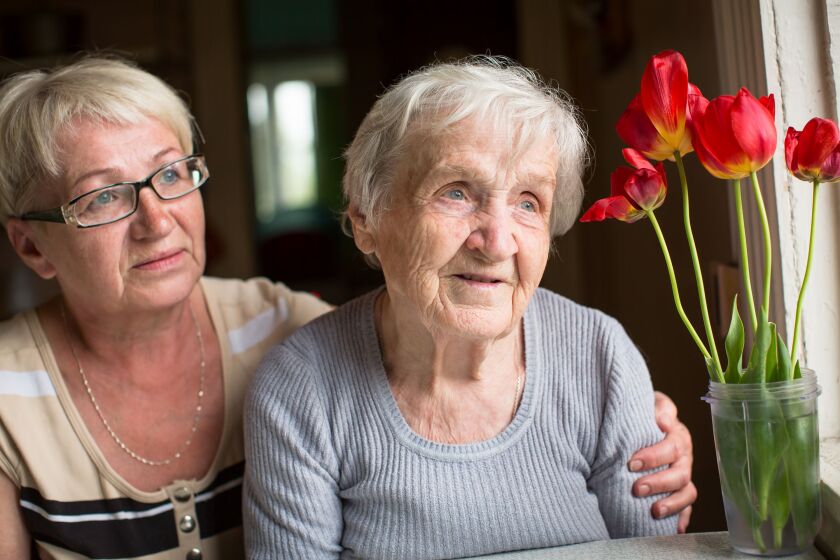After years seeing our parents as healthy, strong and everlasting, we grow up, they get old, and the naive feeling that they are a perpetual part of our lives fades.
Their hearing weakens, their gait slows, their memories dim. That can provoke feelings of anger, anxiety, fear and frustration.
“Many people struggle as they witness age-related decline in their parents’ functioning,” said Laura Carstensen, a Stanford psychology professor and director of its Center on Longevity.
It’s a stressful transition when adults begin to see their parents less as capable caregivers and more as those needing care themselves. Children begin to wonder how quickly a decline will accelerate, how financially sound their parents are, what their future living situation will be.
The shifting roles between child and parent can challenge family dynamics.
“It’s a strange shift from when they were responsible for you,” said Alan Castel, principal investigator at UCLA’s Memory & Lifespan Cognition Lab and author of ”Better with Age: The Psychology of Successful Aging.” “Now, you might be responsible for them, and they’re not listening to your orders the way an 8-year-old would.”
Adults can experience a subtle grief as their parents age and lose their ability to do the things they once did.
Children might want to deny their parents’ decline, which experts say can be amplified by a culture that suggests aging should be fought or hidden.
Stereotypes about aging can complicate the dynamic between adult children who see their parents in need of help and the parents who are apt to reject anything that identifies them as older or more vulnerable.
“When you think of an older adult, you think of maybe wise or kind, but explicitly and implicitly we also see older people as smelly, slow, bad drivers, stubborn or crotchety,” Castel said.
The normal stresses of grappling with an aging parent are made more difficult by competing caregiving demands. Nearly half of adults in their 40s and 50s have a parent 65 or older and are either raising a young child or financially supporting a child 18 or older, according to the Pew Research Center. About one in seven is financially supporting an aging parent and a child — thus the label the “sandwich generation.”
The financial and emotional stress of both can lead to what Castel calls “caregiver stress,” especially when the aging parent doesn’t want the care.
When a parent’s health is deteriorating, good communication can make the transition easier.
“It’s thinking about how to communicate things effectively without being condescending,” Castel said. “Sometimes, it’s saying, ‘I love you, and I’m doing this because it can make your life better in some ways. I know it doesn’t feel comfortable.’ ”
Castel suggests asking older parents questions such as, “Do you like it when I do this?” Or: “Do you know why I’m doing this?”
An older parent might say, “I hate it when you keep telling me to wear a hearing aid.” But the child can reply with, “Well, I feel like I have to repeat things or you sometimes miss things.”
Children need to pick their battles. If a parent’s hearing is decreasing but they can still participate in a conversation, maybe don’t push the hearing aid. If memory is declining but no one is getting lost coming home, continuing to observe might be a good strategy.
Children can be clear with their parents that they might not be able to do as many things as they used to do but also assure their parents they will do their best to help them participate in things that are most meaningful to them.
Children also can help navigate the transition by seeking support from siblings or caregiver support groups.
Experts say it’s important for people to accept the process and to acknowledge there are things that get better with age. Older people might be more emotionally intelligent, more judicious and more deliberate in ways that serve them well.
“Virtually all people will encounter physical problems as they age,” Carstensen said. “The issue is less about avoiding the inevitable and more about living satisfying lives with limitations. Accepting aging and mortality can be liberating.”
Acceptance can be the goal, though watching a parent age can be challenging not only because of what’s happening to the parent but also because of what the child knows will happen to them one day.
“It scares us,” Castel said. “We think, ‘That could be me one day. And, in fact, if everything goes well, that will be me one day.’ One thing to say to yourself is, ‘How do I want my child to treat me?’ ”
Read more at usatoday.com






